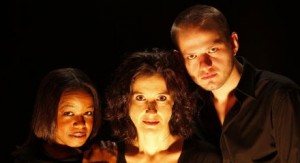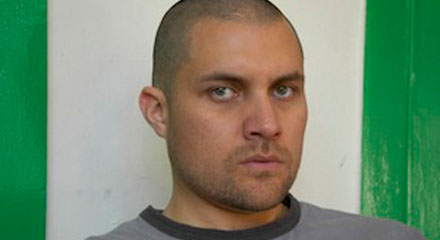Fuse Theater Review: The Art of Escaping from Dread — Guillermo Calderón’s “Neva”
Bianco Amato is a marvel as Anton Chekov’s widow, Olga Knipper, who can turn her fake emotions on a ruble.
Neva. Written and directed by Guillermo Calderón. The Public Theater staging presented by ArtsEmerson. At the Jackie Liebergott Black Box, Boston, MA, through April 7.
By Gerald Peary.
Guillermo Calderón, a Chilean who grew up under the Pinochet dictatorship, is someone obsessed with the role of art when the world outside is a horror. He understands that art can be nurturing and fulfilling and that the best of it survives long after the stormy political issues of the day are dim history, i.e., the masterly Russian plays of Anton Chekhov, still relevant and thrilling past the Czar, the Communists, the post-Communists. But he’s equally concerned with how making art, and consuming art, allows one to escape from the dread.
Calderón’s self-directed, one-act play, Neva, feels like a work-in-progress forum for his absorptions, compelling but open to improvement. It’s St. Petersburg 1905, and the winter streets are beet red from the slaughter of Russian citizenry by soldiers of the Czar. But we are inside a cozy, toasty theater on Bloody Sunday, where a rehearsal of Chekhov’s The Cherry Orchard is supposed to occur. The star is Olga Knipper, six months a widow after the tubercular death of her husband, Anton, the immortal playwright himself. She’s unhappy to be in St. Petersburg in any case, so far away in the freezing provinces from her beloved Moscow, where she is a darling of the court. But where or where are the actors so the rehearsal can begin for this visiting celebrity?
It seems that the actors too are being held up by events in the street. Some of them might be in danger of being killed. But two of the thespians do show up, and Olga, who lives to act, and act, and act, makes do with little, improvised mini-dramas involving the three, including chamber-play, gossipy flirtations, and several reenactments of Chekhov’s death. What is clear is that, for Olga, all the world is a melodramatic stage, an opportunity for emoting and gesture, and that, in her soul, she cares as little about her late husband as she does about the impending Russian Revolution.
Bianco Amato is a marvel as Olga, who can turn her fake emotions on a ruble. In several fabulous moments, her Olga jumps into an affecting speech from The Cherry Orchard or The Three Sisters with trembling, ersatz sincerity, as if she was living the whole weighty play. With Amato, we have before us Garbo storming through MGM claptrap or Carole Lombard’s sublime actress fraud in Howard Hawks’s 1934 comedy, Twentieth Century. Unfortunately, you also have Calderón’s play, often beautifully written, making some awkward turns—an unfortunate, unnecessary side plot involving Chekhov and his neurotic sister—and a just-adequate actress, Quincy Tyler Bernstine—incapable of the demonic power necessary for the play’s ending soliloquy, condemning “the theatre as shit, and audiences as shit.”
Tagged: Anton Chekhov, ArtsEmerson, Bianco Amato, Guillermo Calderón, Neva


